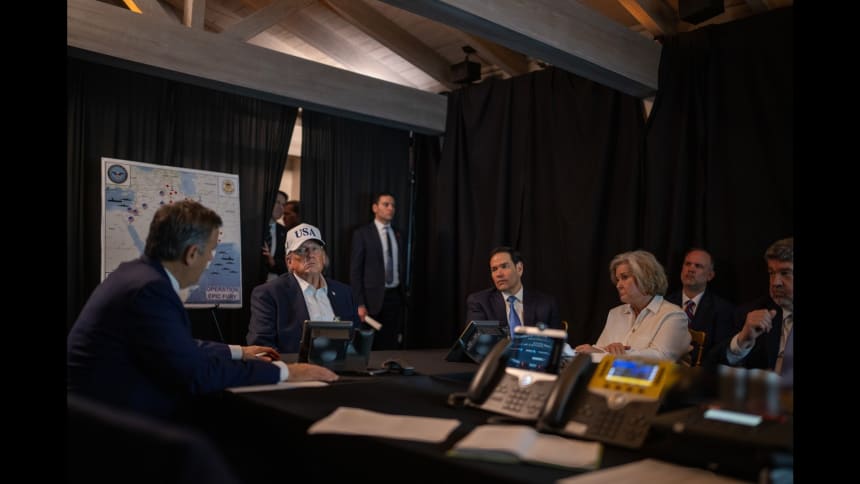The Dictatorship
The incredible irony of Trump demanding praise for his new trade ‘deals’

Since returning to office, President Donald Trump’s trade strategy has largely revolved around poorly solving the problems of his own creation. Just in the last week we’ve seen him trumpet supposedly historic deals that, on closer inspection, fail to even undo the damage that he caused in the first place. As the number of these quasi-agreements pile up, with little to show to American consumers or manufacturers and none of the major deals he’d promised in sightit will be hard for his administration to keep ignoring the growing mess that he’s made.
It’s hard to see what — if anything — the U.S. has gotten out of the last four months
Most recently, the U.S. and China reached at least a temporary ceasefire in the trade war that Trump launched shortly after his return to office. When talks began in Geneva over the weekend, American companies were paying a 145% tariff on goods imported from China, a truly ludicrous number that was entirely unsustainable from the moment it was levied. The number only ratcheted that high in the first place due to Trump’s mistaken belief that China would quickly back down from a trade fight. Instead, China retaliated with tariffs of its own and refused to yield to Trump’s demands for major concessions.
Looking at the deal the two countries announced Monday morning, it’s hard to see what — if anything — the U.S. has gotten out of the last four months. The two sides agreed to reduce tariffs on each other’s productswith a 30% levy remaining on Chinese imports to the U.S. and a 10% rate for American imports to China, with more formal talks to come. But that still doesn’t undo the several weeks of uncertainty that U.S. companies have faced and the several weeks this summer where shelves will likely reflect the slowdown in traffic at West Coast seaports.
Those talks with Beijing came on the heels of Trump announcing a supposed trade agreement with Britain, the first since “Liberation Day” early last month. But both sides begrudgingly admitted last week that despite the fanfare, there was no actual deal in place to be signed as many of the details remain to be ironed out. What little information was given made clear the pending deal is not the sweeping agreement that Trump would prefer, one that could replace the losses from London leaving the European Union. And, adding insult to injury, the universal 10% import tariff that Trump had ordered would remain in place for British goods.
Trump had caused less of a rift with the U.K., long one of America’s closest allies, than with China, but even in trying to patch up that relationship he damaged another. As part of his tariff crusade, in late March he imposed a 25% tariff on imported vehicles and foreign-made auto parts, in theory to help support domestic automakers. Last month, under pressure from those U.S. automakers, the White House retreated slightlycreating a still-complicated scheme to offset some of the stacked import fees that were hammering the U.S. companies’ bottom lines.
The efforts to then undo the problems he causes will remain themselves half-hearted, so long as Trump is still convinced that the tariffs will pay off handsomely.
And now those same companies are now frustrated about one of the few details we do know about the deal-to-be with Britain. As Fortune reported last weekthe announced tentative framework “would see among other concessions the U.S. drop its 25% sectoral tariff down to 10% of a vehicle’s value, a level that reflects the U.K.’s own duty on imported cars. While that is only valid for the first 100,000 vehicles — with any cars above and beyond that once again subject to the full duty — it neatly matches the volumes exported from Britain last year.”
None of this flailing has improved America’s standing in the global economy. Nor has it persuaded Americans skeptical about the supposed positive impact from Trump’s economic plans. Perhaps that’s because even when the president is clearly backing down, as he has repeatedly since taking office, he persists in arguing that tariffs are a panacea for ailing American companies. The efforts to then undo the problems he causes will remain themselves half-hearted, so long as Trump is still convinced that the tariffs will pay off handsomely.
It is a commonly understood bit of courtesy that if you cause a spill, you should be the one to clean it up. As such, if you then demand praise for doing so, you’ll likely catch a bit of a side-eye — especially if it turns out the floor is still messier than it was to begin with. Trump is demanding not just praise but adulation for his dealmaking skills even as the mess he made continues to stain America’s good name and trickle down to U.S. consumers.
Hayes Brown is a writer and editor for BLN Daily, where he helps frame the news of the day for readers. He was previously at BuzzFeed News and holds a degree in international relations from Michigan State University.
The Dictatorship
The Latest: US and Israel attack Iran as Trump says US begins ‘major combat operations’

Rice secures 80-74 win over Temple
Anthony’s 16 help Iona beat Manhattan 69-65
Folefac scores 23 as Siena beats Rider 76-61
SnoCountry Mountain Reports
Gulf States Sportswatch Daily Listings
Quinnipiac wins 67-63 against Canisius
The Dictatorship
‘It’s fantastic’: Trump tells MS NOW he’s seen celebrations after Iran strikes
President Donald Trump called the celebrations in the streets of Iran “fantastic” following the killing of the country’s supreme leaderAyatollah Ali Khamenei, during a brief phone call with MS NOW on Saturday night.
Trump told MS NOW that he’s seen the celebrations in Iran and in parts of America, after joint U.S.-Israel airstrikes killed Khamenei.
“I think it’s fantastic,” the president said of the celebrations. “I’ve seen them in Los Angeles, also — celebrations.”
“I’ve seen them in Los Angeles, celebrations, celebrations,” Trump said, accentuating the point.
The interview took place roughly 11 hours before the Pentagon announced the first U.S.military casualties of the war. U.S. Central Command said three American service members were killed in action, and five others had been seriously wounded.

Revelry broke out in Iran, the United States and across the globe on Saturday, with Iranians cheering the death of Khamenei, who led Iran with an iron fist for more than 30 years, cracking down on dissent at home and maintaining a hostile posture with the U.S. and Israel.
Asked how he was feeling after the strike on Khamenei, whose death was confirmed just a few hours earlier, Trump said it was a positive development for the United States.
“I think it was a great thing for our country,” he said.
The call — which lasted less than a minute — came after a marathon day, which began in the wee hours of the morning with strikes on Iran and continued with retaliatory ballistic missiles from Tehran targeting Israel and countries in the Middle East region that host U.S. military bases.
The day ended with few answers from the White House to increasing questions about the long-term future of Iran, how long the U.S. will continue operations there, and the metastasizing ramifications it could have on the world stage. In fact, the president has done little to convince the public to back his Iran operation, nor to explain why the country is at war without the authorization of Congress.
On perhaps the most consequential day of his second term, Trump did not give a formal address to the public, nor did he hold a press conference. Instead, he stayed out of public view at Mar-a-Lago, his private club and residence in Palm Beach, Florida, where he attended a $1 million-per-plate fundraising dinner on Saturday evening.
But throughout the day, Trump took calls from reporters at various new outlets, including from MS NOW at around 11 p.m. ET.
The strikes, known formally as “Operation Epic Fury,” came after months of talks over Iran’s nuclear program, and warnings from Trump that he would strike Tehran if they did not agree to his often shifting conditions.
At 2:30 a.m. ET on Saturday, Trump posted a video to social media announcing the operation, which he said was designed to “defend the American people by eliminating imminent threats from the Iranian regime, a vicious group of very hard, terrible people.”
“The lives of courageous American heroes may be lost and we may have casualties. That often happens in war,” Trump said when he announced the strikes on Iran.
Mychael Schnell is a reporter for MS NOW.
Laura Barrón-López covers the White House for MS NOW.
The Dictatorship
Pentagon announces first American casualties in Iran

Three U.S. service members were killed and five seriously wounded as the United States and Israel launched attacks on Iran, U.S. Central Command said Sunday morning.
The three service members — the first Americans to die in the conflict — were killed in Kuwait, a U.S. official said.
Several others sustained minor injuries from shrapnel and concussions but will return to duty, the Pentagon said. The identities of the dead and wounded have not been made public.
“The situation is fluid, so out of respect for the families, we will withhold additional information, including the identities of our fallen warriors, until 24 hours after next of kin have been notified,” Central Command said in a statement.
The U.S. and Israel launched sweeping airstrikes on Iranon Saturday, killing Ayatollah Ali Khameneithe country’s supreme leader for nearly four decades. Iran has vowed retaliation and hit several U.S. military bases across the region.
According to U.S. Central Command, Iran has also attacked more than a dozen locations, including airports in Dubai, Kuwait and Iraq, and residential neighborhoods in Israel, Bahrain and Qatar.
Israel Defence Forces said Sunday that Iran fired missiles toward the neighborhood of Beit Shemesh, killing civilians. The missile hit a synagogue, killing at least nine people, according to the Associated Press.
AP reported that authorities said at least 22 people were killed and 120 others wounded when demonstrators tried to attack the U.S. Consulate in Karachi in Pakistan.
The violence came after the United States and Israel attacked Irankilling its Supreme Leader Ayatollah Ali Khamenei. Police and officials at a hospital in Karachi said that at least 50 people were also wounded in the clashes and some of them were in critical condition.
On Sunday, Israel Defence Forces said on X, “It’s official: All senior terrorist leaders of Iran’s Axis of Terror have been eliminated.”
President Donald Trump told CNBC’s Joe Kernen on Sunday that the operation in Iran is “moving along very well, very well — ahead of schedule.”
In a phone call with MS NOW late Saturday, Trump called the celebrations in the streets of Iran “fantastic” following the killing of Khamenei.
Confirming Khamenei’s death, Prime Minister Benjamin Netanyahu said Sunday: “We have eliminated the tyrant Khamenei and dozens of senior figures of the oppressive regime. Our forces are now striking at the heart of Tehran with increasing intensity, set to escalate further in the coming days.”
The exchange of hostilities comes after weeks of fragile negotiations between the U.S. and Iran over Iran’s nuclear operations.
Esmail Baghaei, a spokesperson for Iran’s foreign ministry, called the joint U.S-Israeli attack an “unprovoked, unwarranted act of aggression” in an interview with MS NOW’s Ali Velshi on Sunday. He said Iran’s nuclear program has been used a pretext for the attack.
“We have every right to defend our people because we have come under this egregious act of aggression,” Baghaei said.
Trump announced the attack early Saturday during a short video posted on his Truth Social account. He called for an end to the Iranian regime and urged Iranians to “take back the country.”
Negotiators and mediators from Oman were supposed to meet in Vienna on Monday to discuss the technical aspect of a potential nuclear deal.
Rep. Eric Swawell, D-Calif., told MS NOW’s Alex Witt on Sunday afternoon that the president’s military operation in Iran was illegal, echoing what many lawmakers have said in citing that under the U.S. Constitution only Congress can declare war.
“This is a values argument. We don’t just lob missiles into other countries when we are not provoked, attacked and have no plan for what comes next,” he said.
“We have been shown zero evidence that anything changed in Iran from last year when the president did not come to Congress and took a strike on Iran,” Swalwell said.
In June the U.S. struck three Iranian nuclear sites. Trump said the facilities had been “completely and totally obliterated.” But experts and U.S. officials said the sites were damaged but not destroyed.
Erum Salam is breaking news reporter for MS NOW, with a focus on how global events and foreign policy shape U.S. politics. She previously was a breaking news reporter for The Guardian and is a graduate of Texas A&M University and the Columbia University Graduate School of Journalism. Follow her on X, Bluesky and Instagram.
Akayla Gardner is a White House correspondent for MS NOW.
-

 The Dictatorship1 year ago
The Dictatorship1 year agoLuigi Mangione acknowledges public support in first official statement since arrest
-

 Politics1 year ago
Politics1 year agoFormer ‘Squad’ members launching ‘Bowman and Bush’ YouTube show
-

 Politics1 year ago
Politics1 year agoBlue Light News’s Editorial Director Ryan Hutchins speaks at Blue Light News’s 2025 Governors Summit
-

 The Dictatorship6 months ago
The Dictatorship6 months agoMike Johnson sums up the GOP’s arrogant position on military occupation with two words
-

 Politics1 year ago
Politics1 year agoFormer Kentucky AG Daniel Cameron launches Senate bid
-

 The Dictatorship1 year ago
The Dictatorship1 year agoPete Hegseth’s tenure at the Pentagon goes from bad to worse
-
Uncategorized1 year ago
Bob Good to step down as Freedom Caucus chair this week
-

 Politics11 months ago
Politics11 months agoDemocrat challenging Joni Ernst: I want to ‘tear down’ party, ‘build it back up’



